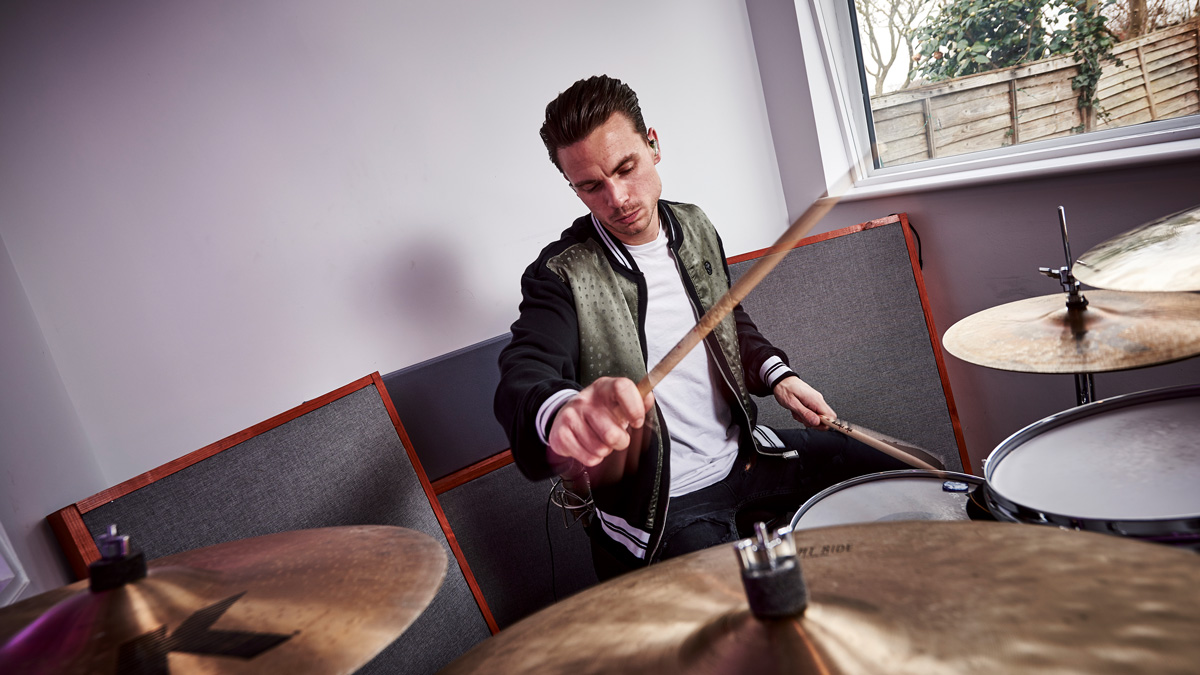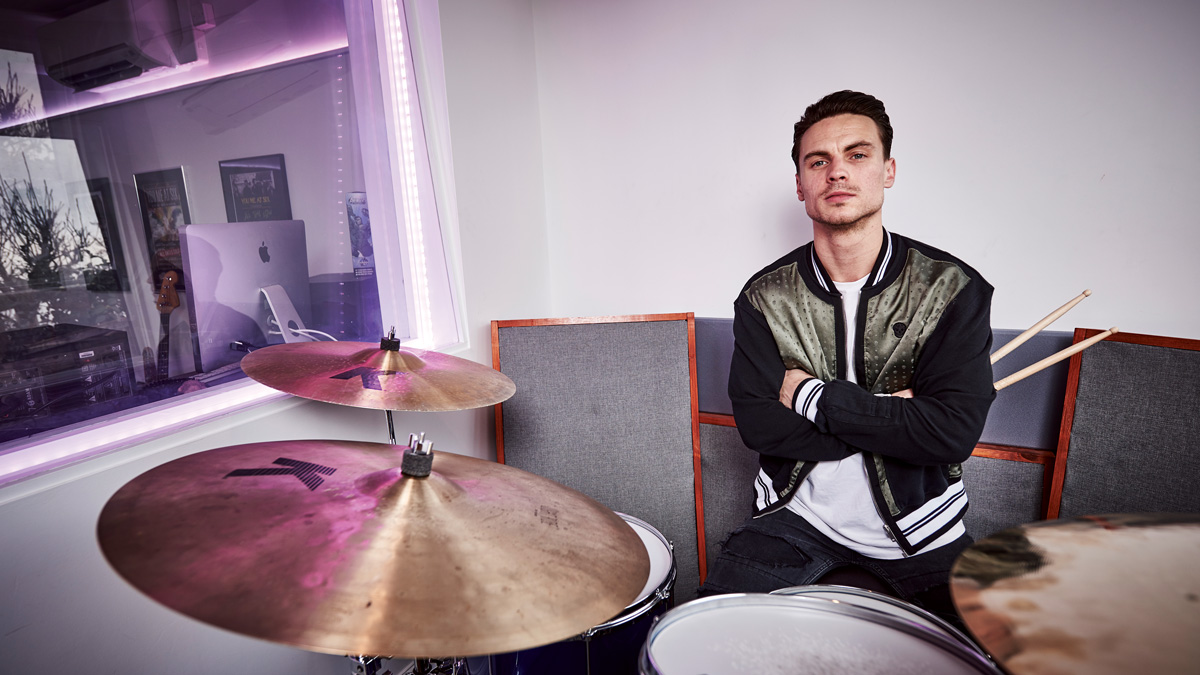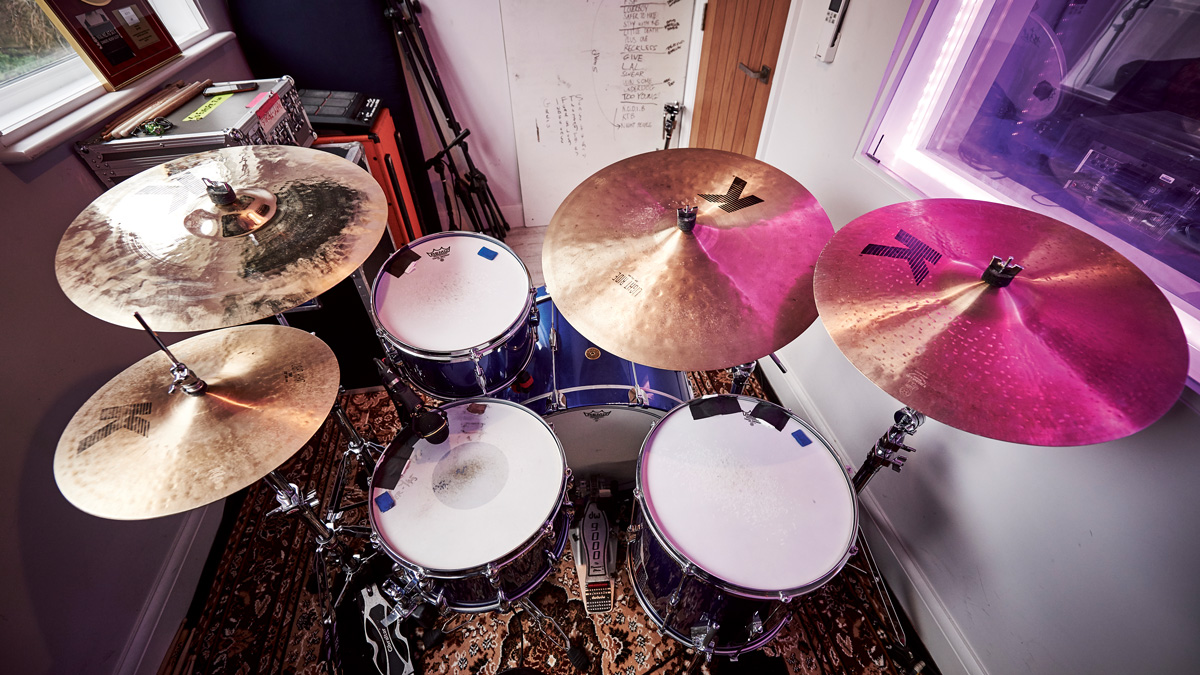You Me At Six drummer Dan Flint talks hit albums and building his own drum cave
'Rim-playing hero' talks Night People

Ten years strong
Ten years in and UK chart-toppers You Me At Six are going from strength to strength. Dan Flint, the band’s self-loathing, rim-playing drum hero explains how they’ve done it.
“We had the ten-year anniversary of our band so we wanted to take a step back,” You Me At Six’s Dan Flint told us on the eve of the UK rock heroes releasing their fifth record, Night People. “We wanted a moment to recap on what we’d done in the last ten years and look at what we had achieved.”
And who can blame them? Since forming a decade ago the band has plenty to sit back and admire. They’ve clawed their way from the pop rock toilet club circuit to becoming an established arena band.
On the way they’ve scored four Top Five albums, including a Number One slot for 2014’s coming-of-age record Caviller Youth.
Drummer Flint has been a major part of the band’s rise and rise. Here is a drummer very much in the mould of his hero Travis Barker. No, we’re not saying that Dan is a Travis knock-off. Instead he's a sticksman that is not afraid to think outside of the box, introducing complexity into the Surrey rockers’ sound with everything from shuffle patterns to beats tapped out on the rims of his toms.
On Night People, he continues to shine. There are several moments during our first playthrough of the record where we note ‘Flint-isms’ within the drum work. Having previously spoken to Flint in this very magazine about the importance he places on a drummer finding their own distinct sound, we’re pleased to hear that he has done just that.
He did it with the help of esteemed, Grammy-winning producer Jacquire King (whose credits include Kings Of Leon, Norah Jones and James Bay), as the boys headed off to the iconic Blackbird Studios in Nashville to record the album that may very well set their place as the UK’s biggest rock band firmly in stone. And so, just a couple of weeks before the album hit, we spoke to Dan to get the ins and outs of not just how this career-defining record came together, but also to reflect on ten years of You Me At Six, Dan’s continuing quest for perfection and how he made his very own drum cave.
You took a break between finishing the last album cycle and starting work on Night People, why was that?
“We became adults, we all bought houses. We didn’t want to write music because we had to, we wanted to do it if it excited us and it happened naturally. I ended up building a studio in my house. That gave us the freedom to write whenever we wanted to. We had never had that before. If we wrote something that didn’t sound like You Me At Six it didn’t mean we had to stop and move on because we didn’t have the usual time restraints. We had freedom to do whatever we wanted to do.”
If I’m bored then I should be in there playing. I use it for everything. I might as well not have a house, I might as well just have the studio
Building your own home studio sounds like every drummer’s dream
“It was 100% a dream process. When I was growing up my mum was nice enough to let me take over her garage and I did a cheap version of what I have now. It was always the dream to have this soundproofed room in my house where I could do work on ideas at whatever time of day and I can record them and send them to the boys.”
Are you playing more because you’ve got this facility right there in your home?
“Yeah, loads more. There’s not a day that goes by where I can say I’m bored. If I’m bored then I should be in there playing. I use it for everything. I might as well not have a house, I might as well just have the studio.”

Into the studio
Speaking of studios, you recorded Night People at one of the best in the world – Blackbird Studio in Nashville. How inspiring was that?
“Oh my god it is an incredible place. The albums they’ve made there is incredible. If anything will inspire you to be a better musician and songwriter, then walking into that studio is it. You’re there to create something magical. You put your heart and soul into it when you’re there.”
Hence why you took your time and did your homework before setting foot in the studio?
“Exactly. We were so prepared by the time we got to Nashville. We knew we could nail it. We feel that we definitely nailed it. We did a trip in February where we tracked eight of the songs in three weeks. We got the bulk of those eight songs down and then went back in June and finished off another four and then did overdubs. That break in the middle allowed us to have a listen and go back really focused, knowing what we had to do to finish off the record. It’s a record we’re very proud of. It’s a record that really lends it to itself to listening to it front to back, it tells a story. I had a listen to it yesterday and it reiterated that point. I try to not hammer listening to a new album because I’ve got to live with it for the next two years playing it night after night but I’m really excited about this album.”
One of the coolest things about Blackbird is that they have a room full of gear. It’s full of the most insane equipment. There’s a microphone room with $3million of microphones
Tell us about the process of tracking drums for Night People
“We tried many different kits. One of the coolest things about Blackbird is that they have a room full of gear. It’s full of the most insane equipment. There’s a microphone room with $3million of microphones. One snare I used was from 1918, an unbelievable Ludwig. I used some Leedy, some Ludwig, some Brady. Again, it was about freedom, there was no restraint because we had all of this gear.”
It sounds like you went for a song-by-song vibe tone-wise rather than an overarching full album approach
“We recorded each song individually. We didn’t bash out the drums individually. On previous records I recorded the drums in two-and-a-half days and then sat around for a month-and-a-half. On this we treated each song like its own thing. You can’t record 16 tracks for an album in two-and-a-half days and not repeat yourself. Doing it song by song helped the creativity. We also recorded live together as a band. Jacquire wanted to capture what he said was best about our band – five people playing live music. Live music has soul, it moves. Some songs we didn’t even record to a click track. If the click was holding us back or pushing us too fast we would record without one. That’s how you create something special, this music has a soul.”
Drum-wise it is a varied album, from big rock anthems to tracks that hark back to the band’s first couple of records. Was that a product of the way you recorded?
“Because we did each song individually I changed the kit maybe four times during the recording. A song like Night People goes well with Plus One and then Swear goes well with Make Your Move and then songs like Brand New and Take On The World go together. We have three or four pockets of the album that go together and we have these different shades and flavours. That all comes from the way we recorded. In the past we might find a great guitar sound or drum sound and use it for the whole album, that wasn’t what we did this time.”

Finding an identity
The title track is a tasty part with some nice open hats
“That was an interesting one. That song started with me building tracks on the computer. I’m interested in the production side of things and on that one I built tracks up in ProTools. I knew I wanted it to be a rock track with a bit of hip-hop influence thanks to that stomp and clap vibe. But, we’re a rock band and I knew I had to play this song live, so I needed to find a creative way to make sure my drums enhanced what the patterns were doing. It wasn’t really until we got into the studio that I showed Jacquire and told him I had this linear pattern. That song has a lot of switching hands, it is a lot more complicated than it sounds, some of the open hi-hat work is cool. Me and Jacquire really worked on that together. I had a lot of brain farts working on that song because there’s left hand, right hand, left foot, right foot and all sorts of things. “
In contrast, Swear feels very much like a Dan Flint drum track in the vein of something like Loverboy
“I like to get creative with rimshots and hi-hat work and open hats. What I don’t like about drums is when people are just trying to do the flashiest thing and have the fastest single stroke or double stroke rolls around the kit. That doesn’t interest me. I find drums cool when you create an interesting pattern, maybe using aspects of the drums that you wouldn’t usually use, like the rims of the toms. On Swear there’s also the hat work and the offbeat shuffle and the kick pattern is shuffled. I like to create exciting patterns rather than just impressive drumming. I want it to be musical. I want to be a musician, not just a drummer. It’s about the song, you’re not there to have your moment and look cool, you’re there to enhance the song. That’s where my head is at when I write beats.”
Did you take it song-by-song in terms of the kit you tracked with?
“I used a ‘60s Ludwig, an old Leedy which was a birch kit, that came out a lot. I used a ’60s 26” kick drum, that was quite a feat to play, after three minutes playing that it was quite a workout. We had this room with 30 or 40 snare drums and half the time I would pick one up and play it without looking at what it was. I wanted to just find the right snares for the songs. I had these Craviotto toms as well that I used a lot and I would bring in different kick drums. It was a bit of a free-for-all of throwing different drums in and out.”
What I don’t like about drums is when people are just trying to do the flashiest thing and have the fastest single stroke or double stroke rolls around the kit
Was dialling in the tones a collaboration between yourself and Jacquire?
“I would give Jacquire an idea of what I had in my head and then we would try a few ideas with kick drums and snares and then we might do a recording of a verse-chorus and I’d go have a listen and make any changes.”
You’ve mentioned that you’re now ten years in, so you’re no longer the pop punk upstarts, you’re an established arena rock band. Is that reflected on this album?
“It’s always been a natural process for us, that maturity. We wrote our first songs when we were 16. We’re always progressing and getting better. In the studio there was a moment where we sat back and realised we could do whatever we wanted to do. The record sounds mature but that comes with working in Blackbird with Jacquire King. We sound like we’ve never sounded before. We’re writing better songs because our playing ability and creativity has improved. This album is far beyond anything we’ve ever done before.”

Still plenty to achieve
How do you think you’ve developed as a drummer in that decade?
“I’d like to think I’ve got better, hopefully. My main thing that I’ve learnt is that I want to be musical. I don’t want people to know that before every chorus I’m going to do a wicked fill. There shouldn’t be a break for you to do a drum fill. It should all flow. It shouldn’t be that there’s a noticeable crazy moment on the drums. You just want to make people feel crazy when they hear the songs live. You need to take people on a journey, from the highest of excitement to more intense moments like the middle section of Swear where I do some off beat moments on the bell of the ride. Moments of pure madness should not interrupt the rhythm of the song.”
How about as a band, how do you assess your ten years together?
“In the break before we recorded I got to get out some of our tour posters that I’ve collected over the years and got them framed and I was able to look and think, ‘Oh wow, we did play Wembley, we did play Alexandra Palace, we did play Brixton Academy nine times.’ We stepped back and looked at the incredible journey that we’ve been on during the last ten years.”
“I’ve got a few Gretsch kits, I love them. I can’t speak highly enough of those. I’ll be taking a USA Custom kit out on the road. I like putting Remo Coated Emperors on the kit in the studio, but live I like the Clear CS Dots. I find they have a lot of attack and they look cool, and live is all about looking cool really, isn’t it [laughs].
I went to the Zildjian factory in Boston and they told me that they had these two prototype crashes that I had to try. They were both 20”, one was a brilliant finish. I tried them and they haven’t been off my kit since. I’m not even sure exactly what they are but I have never heard cymbals like them. They are incredible.”
Ten years - several hit albums, a Number One, arena tours - what’s left to achieve?
“The stage that we’ve got to in the UK having had a Number One album and playing arenas, we want to get to that level in the rest of the world. We’re very ambitious. We’re about to start this album campaign now and it will go on for two years and I’d like to think we could headline Reading and Leeds at the end of it.”
You say you’re ambitious, you’re also very critical of yourself, aren’t you? You seem to also be striving for perfection
“I’m the world’s biggest self-loather. I think I’m rubbish at drums all the time, absolutely terrible. Even when I’m just practising at home I will record and watch it back saying, ‘Why have you done that there? Why did you do that? That doesn’t feel right, I need to improve that.’ I constantly want to be better and improve. That can be quite damaging at points to my ego. But, we’re ambitious people. I will never sit back and say, ‘Yup, that’s perfect, I nailed that and I can stop practising now.’ I always want to get better. You should record what you play and analyse every single moment. I like everything to be precise, every single hit has to have a meaning and has to be there for a reason. I can’t have a fill in there that I just thought of off the top of my head in the set, it all has to be there for a reason.”
Rich is a teacher, one time Rhythm staff writer and experienced freelance journalist who has interviewed countless revered musicians, engineers, producers and stars for the our world-leading music making portfolio, including such titles as Rhythm, Total Guitar, Guitarist, Guitar World, and MusicRadar. His victims include such luminaries as Ice T, Mark Guilani and Jamie Oliver (the drumming one).
